Report on Therapeutics of Depressive Illness: Course Name, Semester
VerifiedAdded on 2022/08/22
|14
|3756
|21
Report
AI Summary
This report provides a comprehensive overview of the therapeutics of depressive illness. It begins by defining depression and highlighting its global impact, including prevalence and associated mortality risks. The report then explores various psychological theories explaining the causes of depression, such as behaviorist, psychodynamic, cognitive, and humanist theories. A significant portion of the report is dedicated to the role of SSRI and SNRI drugs in treating depression, detailing their mechanisms of action, including how they inhibit the reuptake of serotonin and norepinephrine. The report also discusses the time lag in the effectiveness of these drugs and reasons for discontinuation difficulties. Furthermore, the report examines the diverse effects of these drugs on different individuals, the rationale behind these varying effects, and the potential for next-generation antidepressants, including personalized medicine approaches. The report concludes with a discussion on the limitations of current treatments and the ongoing search for more effective and targeted therapies for depressive illness.
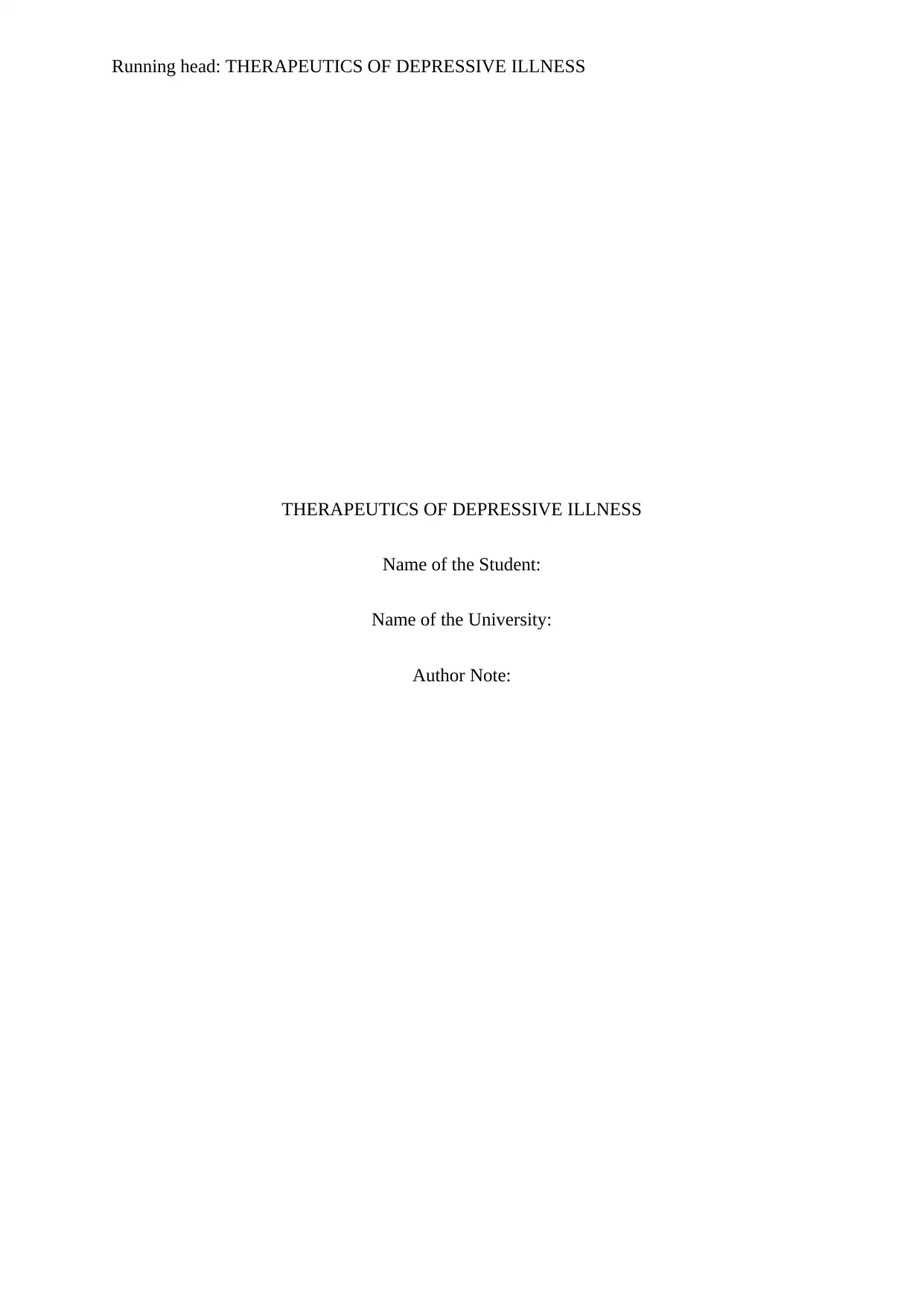
Running head: THERAPEUTICS OF DEPRESSIVE ILLNESS
THERAPEUTICS OF DEPRESSIVE ILLNESS
Name of the Student:
Name of the University:
Author Note:
THERAPEUTICS OF DEPRESSIVE ILLNESS
Name of the Student:
Name of the University:
Author Note:
Paraphrase This Document
Need a fresh take? Get an instant paraphrase of this document with our AI Paraphraser
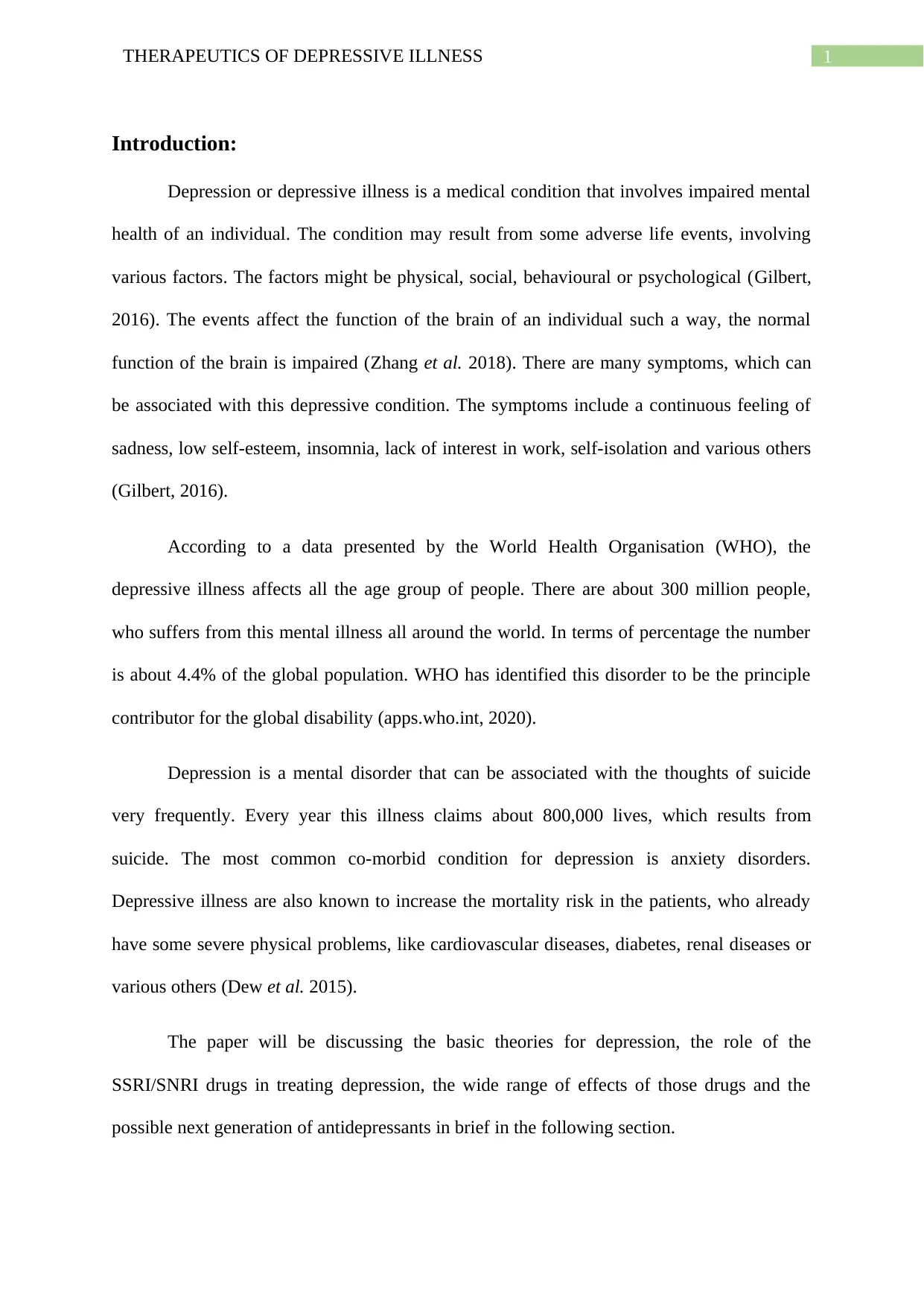
1THERAPEUTICS OF DEPRESSIVE ILLNESS
Introduction:
Depression or depressive illness is a medical condition that involves impaired mental
health of an individual. The condition may result from some adverse life events, involving
various factors. The factors might be physical, social, behavioural or psychological (Gilbert,
2016). The events affect the function of the brain of an individual such a way, the normal
function of the brain is impaired (Zhang et al. 2018). There are many symptoms, which can
be associated with this depressive condition. The symptoms include a continuous feeling of
sadness, low self-esteem, insomnia, lack of interest in work, self-isolation and various others
(Gilbert, 2016).
According to a data presented by the World Health Organisation (WHO), the
depressive illness affects all the age group of people. There are about 300 million people,
who suffers from this mental illness all around the world. In terms of percentage the number
is about 4.4% of the global population. WHO has identified this disorder to be the principle
contributor for the global disability (apps.who.int, 2020).
Depression is a mental disorder that can be associated with the thoughts of suicide
very frequently. Every year this illness claims about 800,000 lives, which results from
suicide. The most common co-morbid condition for depression is anxiety disorders.
Depressive illness are also known to increase the mortality risk in the patients, who already
have some severe physical problems, like cardiovascular diseases, diabetes, renal diseases or
various others (Dew et al. 2015).
The paper will be discussing the basic theories for depression, the role of the
SSRI/SNRI drugs in treating depression, the wide range of effects of those drugs and the
possible next generation of antidepressants in brief in the following section.
Introduction:
Depression or depressive illness is a medical condition that involves impaired mental
health of an individual. The condition may result from some adverse life events, involving
various factors. The factors might be physical, social, behavioural or psychological (Gilbert,
2016). The events affect the function of the brain of an individual such a way, the normal
function of the brain is impaired (Zhang et al. 2018). There are many symptoms, which can
be associated with this depressive condition. The symptoms include a continuous feeling of
sadness, low self-esteem, insomnia, lack of interest in work, self-isolation and various others
(Gilbert, 2016).
According to a data presented by the World Health Organisation (WHO), the
depressive illness affects all the age group of people. There are about 300 million people,
who suffers from this mental illness all around the world. In terms of percentage the number
is about 4.4% of the global population. WHO has identified this disorder to be the principle
contributor for the global disability (apps.who.int, 2020).
Depression is a mental disorder that can be associated with the thoughts of suicide
very frequently. Every year this illness claims about 800,000 lives, which results from
suicide. The most common co-morbid condition for depression is anxiety disorders.
Depressive illness are also known to increase the mortality risk in the patients, who already
have some severe physical problems, like cardiovascular diseases, diabetes, renal diseases or
various others (Dew et al. 2015).
The paper will be discussing the basic theories for depression, the role of the
SSRI/SNRI drugs in treating depression, the wide range of effects of those drugs and the
possible next generation of antidepressants in brief in the following section.
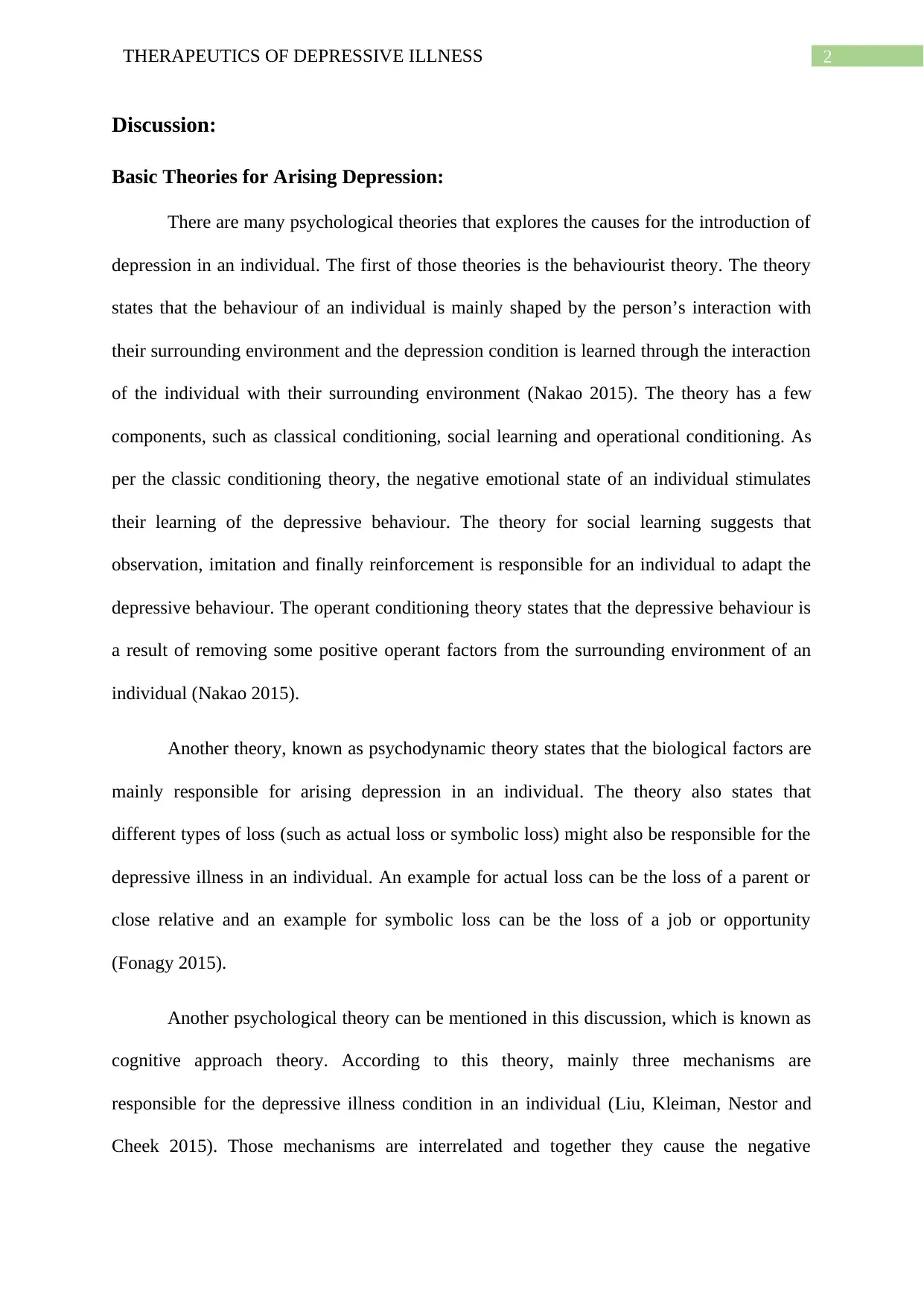
2THERAPEUTICS OF DEPRESSIVE ILLNESS
Discussion:
Basic Theories for Arising Depression:
There are many psychological theories that explores the causes for the introduction of
depression in an individual. The first of those theories is the behaviourist theory. The theory
states that the behaviour of an individual is mainly shaped by the person’s interaction with
their surrounding environment and the depression condition is learned through the interaction
of the individual with their surrounding environment (Nakao 2015). The theory has a few
components, such as classical conditioning, social learning and operational conditioning. As
per the classic conditioning theory, the negative emotional state of an individual stimulates
their learning of the depressive behaviour. The theory for social learning suggests that
observation, imitation and finally reinforcement is responsible for an individual to adapt the
depressive behaviour. The operant conditioning theory states that the depressive behaviour is
a result of removing some positive operant factors from the surrounding environment of an
individual (Nakao 2015).
Another theory, known as psychodynamic theory states that the biological factors are
mainly responsible for arising depression in an individual. The theory also states that
different types of loss (such as actual loss or symbolic loss) might also be responsible for the
depressive illness in an individual. An example for actual loss can be the loss of a parent or
close relative and an example for symbolic loss can be the loss of a job or opportunity
(Fonagy 2015).
Another psychological theory can be mentioned in this discussion, which is known as
cognitive approach theory. According to this theory, mainly three mechanisms are
responsible for the depressive illness condition in an individual (Liu, Kleiman, Nestor and
Cheek 2015). Those mechanisms are interrelated and together they cause the negative
Discussion:
Basic Theories for Arising Depression:
There are many psychological theories that explores the causes for the introduction of
depression in an individual. The first of those theories is the behaviourist theory. The theory
states that the behaviour of an individual is mainly shaped by the person’s interaction with
their surrounding environment and the depression condition is learned through the interaction
of the individual with their surrounding environment (Nakao 2015). The theory has a few
components, such as classical conditioning, social learning and operational conditioning. As
per the classic conditioning theory, the negative emotional state of an individual stimulates
their learning of the depressive behaviour. The theory for social learning suggests that
observation, imitation and finally reinforcement is responsible for an individual to adapt the
depressive behaviour. The operant conditioning theory states that the depressive behaviour is
a result of removing some positive operant factors from the surrounding environment of an
individual (Nakao 2015).
Another theory, known as psychodynamic theory states that the biological factors are
mainly responsible for arising depression in an individual. The theory also states that
different types of loss (such as actual loss or symbolic loss) might also be responsible for the
depressive illness in an individual. An example for actual loss can be the loss of a parent or
close relative and an example for symbolic loss can be the loss of a job or opportunity
(Fonagy 2015).
Another psychological theory can be mentioned in this discussion, which is known as
cognitive approach theory. According to this theory, mainly three mechanisms are
responsible for the depressive illness condition in an individual (Liu, Kleiman, Nestor and
Cheek 2015). Those mechanisms are interrelated and together they cause the negative
⊘ This is a preview!⊘
Do you want full access?
Subscribe today to unlock all pages.

Trusted by 1+ million students worldwide
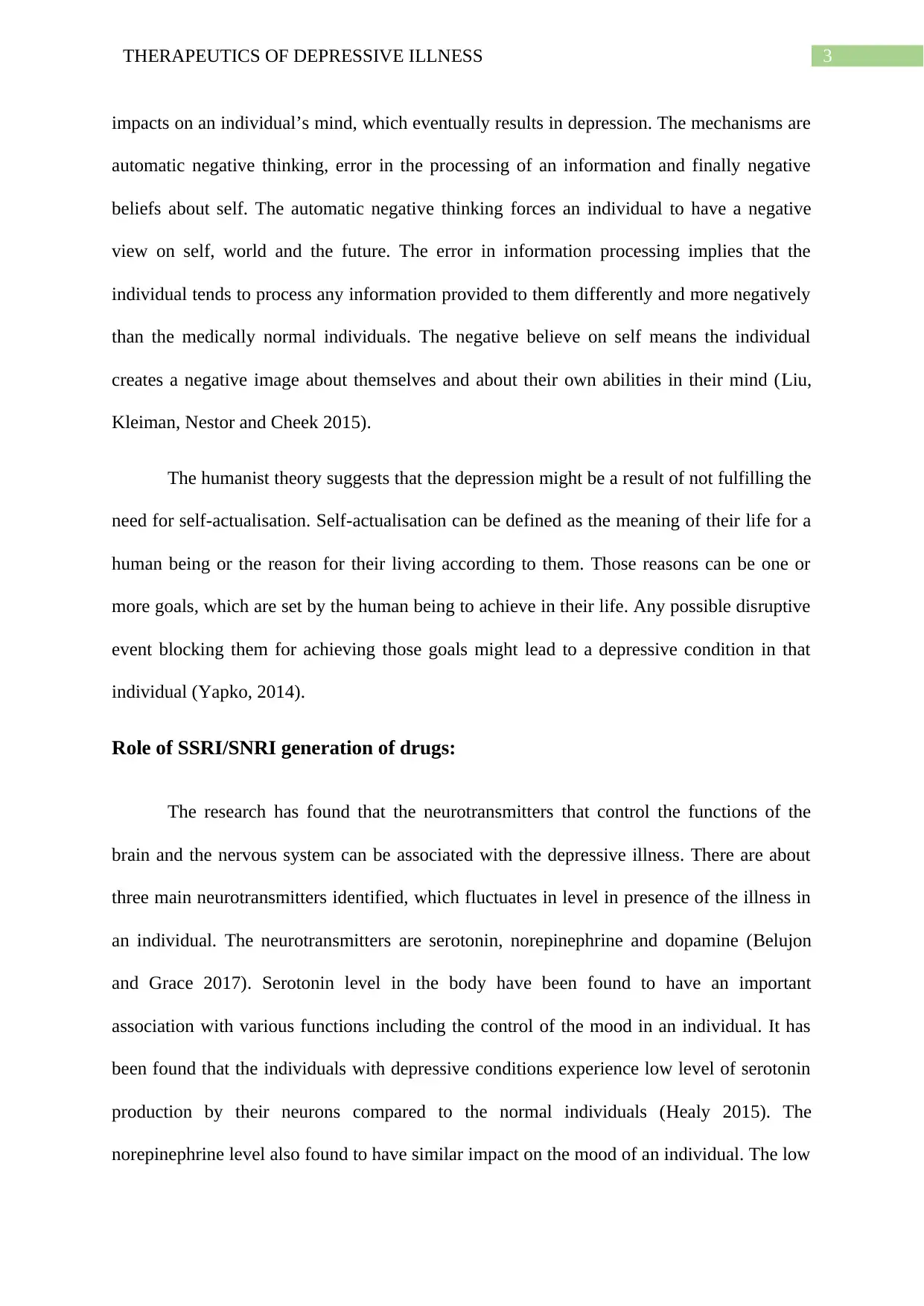
3THERAPEUTICS OF DEPRESSIVE ILLNESS
impacts on an individual’s mind, which eventually results in depression. The mechanisms are
automatic negative thinking, error in the processing of an information and finally negative
beliefs about self. The automatic negative thinking forces an individual to have a negative
view on self, world and the future. The error in information processing implies that the
individual tends to process any information provided to them differently and more negatively
than the medically normal individuals. The negative believe on self means the individual
creates a negative image about themselves and about their own abilities in their mind (Liu,
Kleiman, Nestor and Cheek 2015).
The humanist theory suggests that the depression might be a result of not fulfilling the
need for self-actualisation. Self-actualisation can be defined as the meaning of their life for a
human being or the reason for their living according to them. Those reasons can be one or
more goals, which are set by the human being to achieve in their life. Any possible disruptive
event blocking them for achieving those goals might lead to a depressive condition in that
individual (Yapko, 2014).
Role of SSRI/SNRI generation of drugs:
The research has found that the neurotransmitters that control the functions of the
brain and the nervous system can be associated with the depressive illness. There are about
three main neurotransmitters identified, which fluctuates in level in presence of the illness in
an individual. The neurotransmitters are serotonin, norepinephrine and dopamine (Belujon
and Grace 2017). Serotonin level in the body have been found to have an important
association with various functions including the control of the mood in an individual. It has
been found that the individuals with depressive conditions experience low level of serotonin
production by their neurons compared to the normal individuals (Healy 2015). The
norepinephrine level also found to have similar impact on the mood of an individual. The low
impacts on an individual’s mind, which eventually results in depression. The mechanisms are
automatic negative thinking, error in the processing of an information and finally negative
beliefs about self. The automatic negative thinking forces an individual to have a negative
view on self, world and the future. The error in information processing implies that the
individual tends to process any information provided to them differently and more negatively
than the medically normal individuals. The negative believe on self means the individual
creates a negative image about themselves and about their own abilities in their mind (Liu,
Kleiman, Nestor and Cheek 2015).
The humanist theory suggests that the depression might be a result of not fulfilling the
need for self-actualisation. Self-actualisation can be defined as the meaning of their life for a
human being or the reason for their living according to them. Those reasons can be one or
more goals, which are set by the human being to achieve in their life. Any possible disruptive
event blocking them for achieving those goals might lead to a depressive condition in that
individual (Yapko, 2014).
Role of SSRI/SNRI generation of drugs:
The research has found that the neurotransmitters that control the functions of the
brain and the nervous system can be associated with the depressive illness. There are about
three main neurotransmitters identified, which fluctuates in level in presence of the illness in
an individual. The neurotransmitters are serotonin, norepinephrine and dopamine (Belujon
and Grace 2017). Serotonin level in the body have been found to have an important
association with various functions including the control of the mood in an individual. It has
been found that the individuals with depressive conditions experience low level of serotonin
production by their neurons compared to the normal individuals (Healy 2015). The
norepinephrine level also found to have similar impact on the mood of an individual. The low
Paraphrase This Document
Need a fresh take? Get an instant paraphrase of this document with our AI Paraphraser
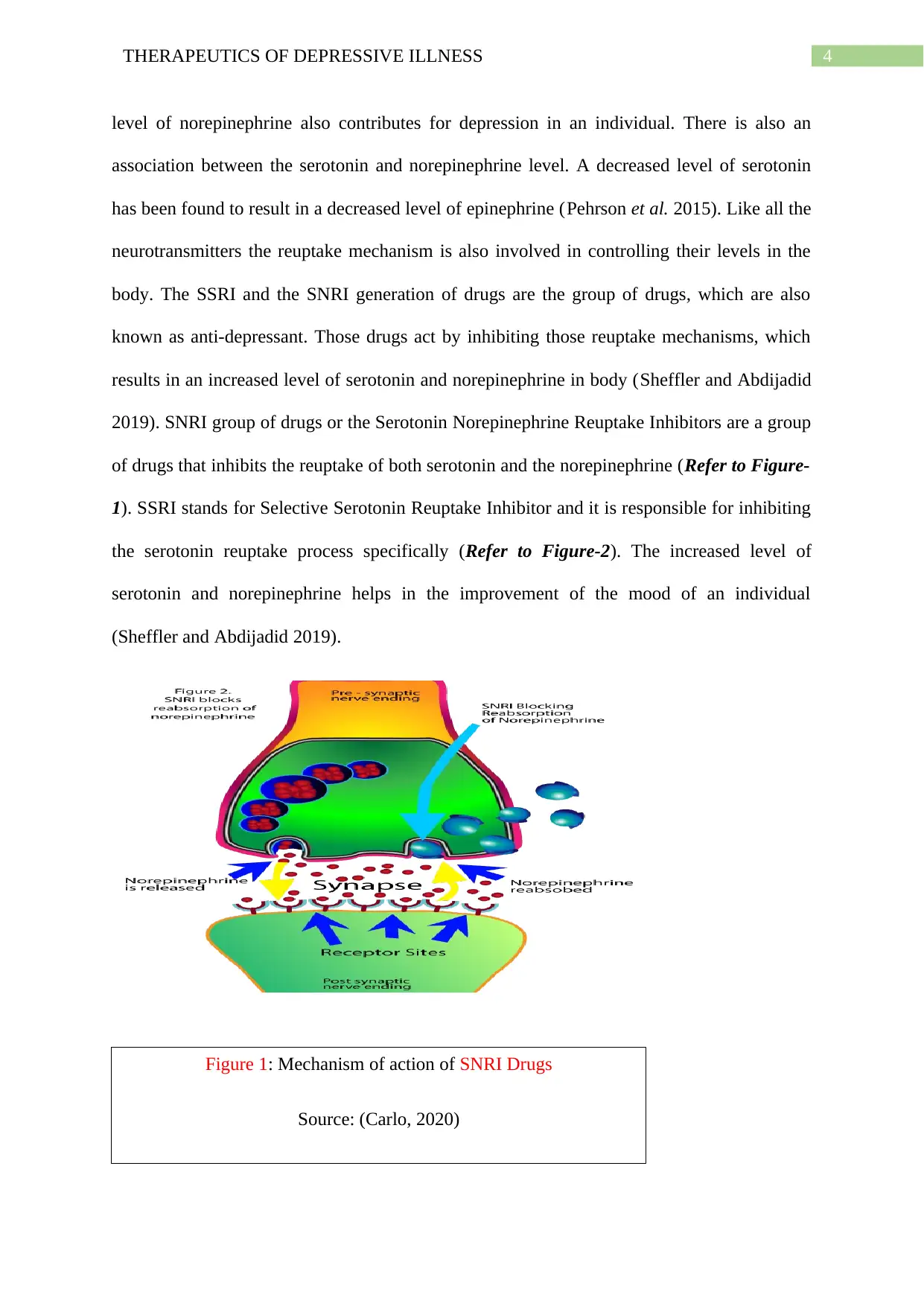
4THERAPEUTICS OF DEPRESSIVE ILLNESS
level of norepinephrine also contributes for depression in an individual. There is also an
association between the serotonin and norepinephrine level. A decreased level of serotonin
has been found to result in a decreased level of epinephrine (Pehrson et al. 2015). Like all the
neurotransmitters the reuptake mechanism is also involved in controlling their levels in the
body. The SSRI and the SNRI generation of drugs are the group of drugs, which are also
known as anti-depressant. Those drugs act by inhibiting those reuptake mechanisms, which
results in an increased level of serotonin and norepinephrine in body (Sheffler and Abdijadid
2019). SNRI group of drugs or the Serotonin Norepinephrine Reuptake Inhibitors are a group
of drugs that inhibits the reuptake of both serotonin and the norepinephrine (Refer to Figure-
1). SSRI stands for Selective Serotonin Reuptake Inhibitor and it is responsible for inhibiting
the serotonin reuptake process specifically (Refer to Figure-2). The increased level of
serotonin and norepinephrine helps in the improvement of the mood of an individual
(Sheffler and Abdijadid 2019).
Figure 1: Mechanism of action of SNRI Drugs
Source: (Carlo, 2020)
level of norepinephrine also contributes for depression in an individual. There is also an
association between the serotonin and norepinephrine level. A decreased level of serotonin
has been found to result in a decreased level of epinephrine (Pehrson et al. 2015). Like all the
neurotransmitters the reuptake mechanism is also involved in controlling their levels in the
body. The SSRI and the SNRI generation of drugs are the group of drugs, which are also
known as anti-depressant. Those drugs act by inhibiting those reuptake mechanisms, which
results in an increased level of serotonin and norepinephrine in body (Sheffler and Abdijadid
2019). SNRI group of drugs or the Serotonin Norepinephrine Reuptake Inhibitors are a group
of drugs that inhibits the reuptake of both serotonin and the norepinephrine (Refer to Figure-
1). SSRI stands for Selective Serotonin Reuptake Inhibitor and it is responsible for inhibiting
the serotonin reuptake process specifically (Refer to Figure-2). The increased level of
serotonin and norepinephrine helps in the improvement of the mood of an individual
(Sheffler and Abdijadid 2019).
Figure 1: Mechanism of action of SNRI Drugs
Source: (Carlo, 2020)
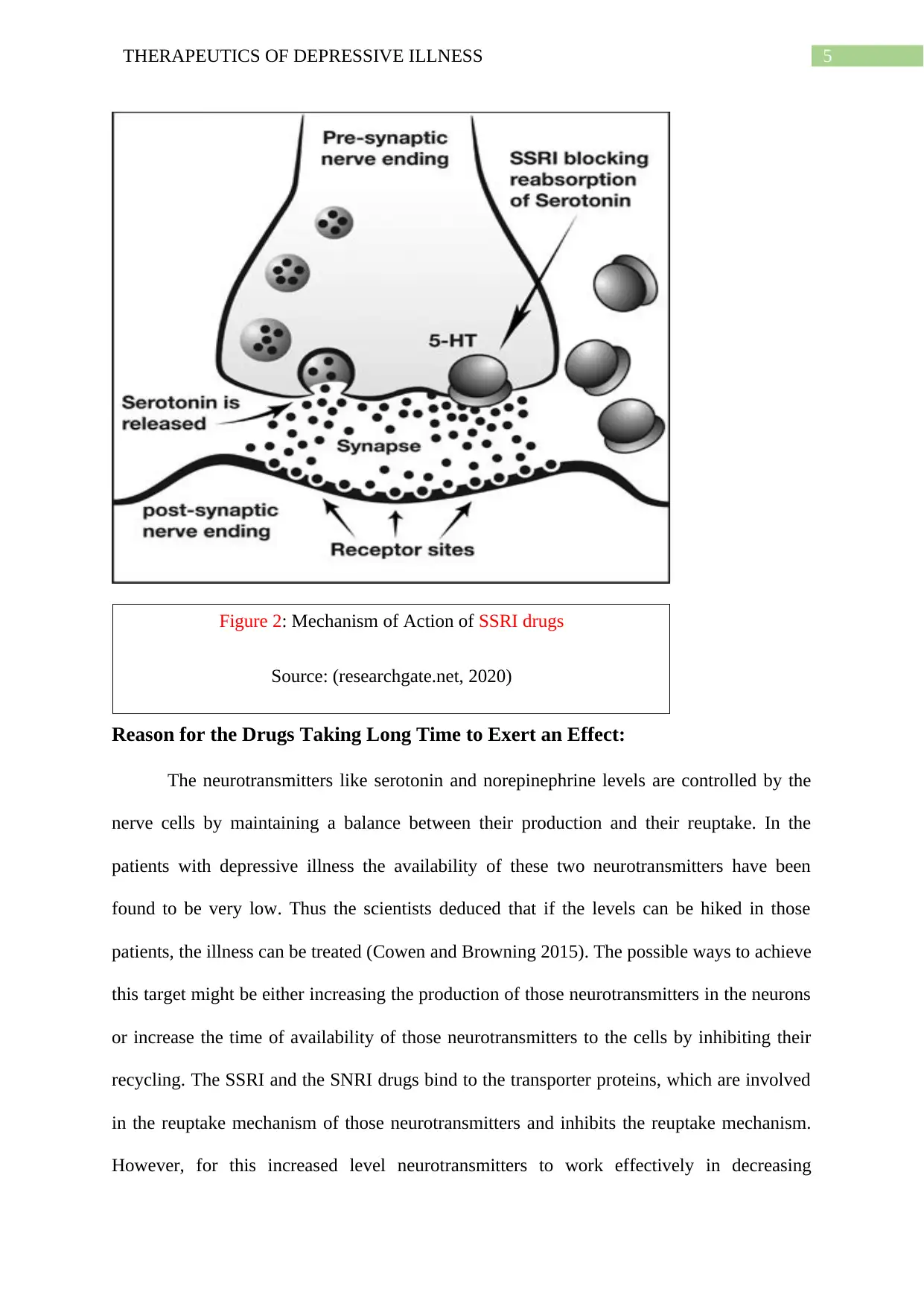
5THERAPEUTICS OF DEPRESSIVE ILLNESS
Reason for the Drugs Taking Long Time to Exert an Effect:
The neurotransmitters like serotonin and norepinephrine levels are controlled by the
nerve cells by maintaining a balance between their production and their reuptake. In the
patients with depressive illness the availability of these two neurotransmitters have been
found to be very low. Thus the scientists deduced that if the levels can be hiked in those
patients, the illness can be treated (Cowen and Browning 2015). The possible ways to achieve
this target might be either increasing the production of those neurotransmitters in the neurons
or increase the time of availability of those neurotransmitters to the cells by inhibiting their
recycling. The SSRI and the SNRI drugs bind to the transporter proteins, which are involved
in the reuptake mechanism of those neurotransmitters and inhibits the reuptake mechanism.
However, for this increased level neurotransmitters to work effectively in decreasing
Figure 2: Mechanism of Action of SSRI drugs
Source: (researchgate.net, 2020)
Reason for the Drugs Taking Long Time to Exert an Effect:
The neurotransmitters like serotonin and norepinephrine levels are controlled by the
nerve cells by maintaining a balance between their production and their reuptake. In the
patients with depressive illness the availability of these two neurotransmitters have been
found to be very low. Thus the scientists deduced that if the levels can be hiked in those
patients, the illness can be treated (Cowen and Browning 2015). The possible ways to achieve
this target might be either increasing the production of those neurotransmitters in the neurons
or increase the time of availability of those neurotransmitters to the cells by inhibiting their
recycling. The SSRI and the SNRI drugs bind to the transporter proteins, which are involved
in the reuptake mechanism of those neurotransmitters and inhibits the reuptake mechanism.
However, for this increased level neurotransmitters to work effectively in decreasing
Figure 2: Mechanism of Action of SSRI drugs
Source: (researchgate.net, 2020)
⊘ This is a preview!⊘
Do you want full access?
Subscribe today to unlock all pages.

Trusted by 1+ million students worldwide
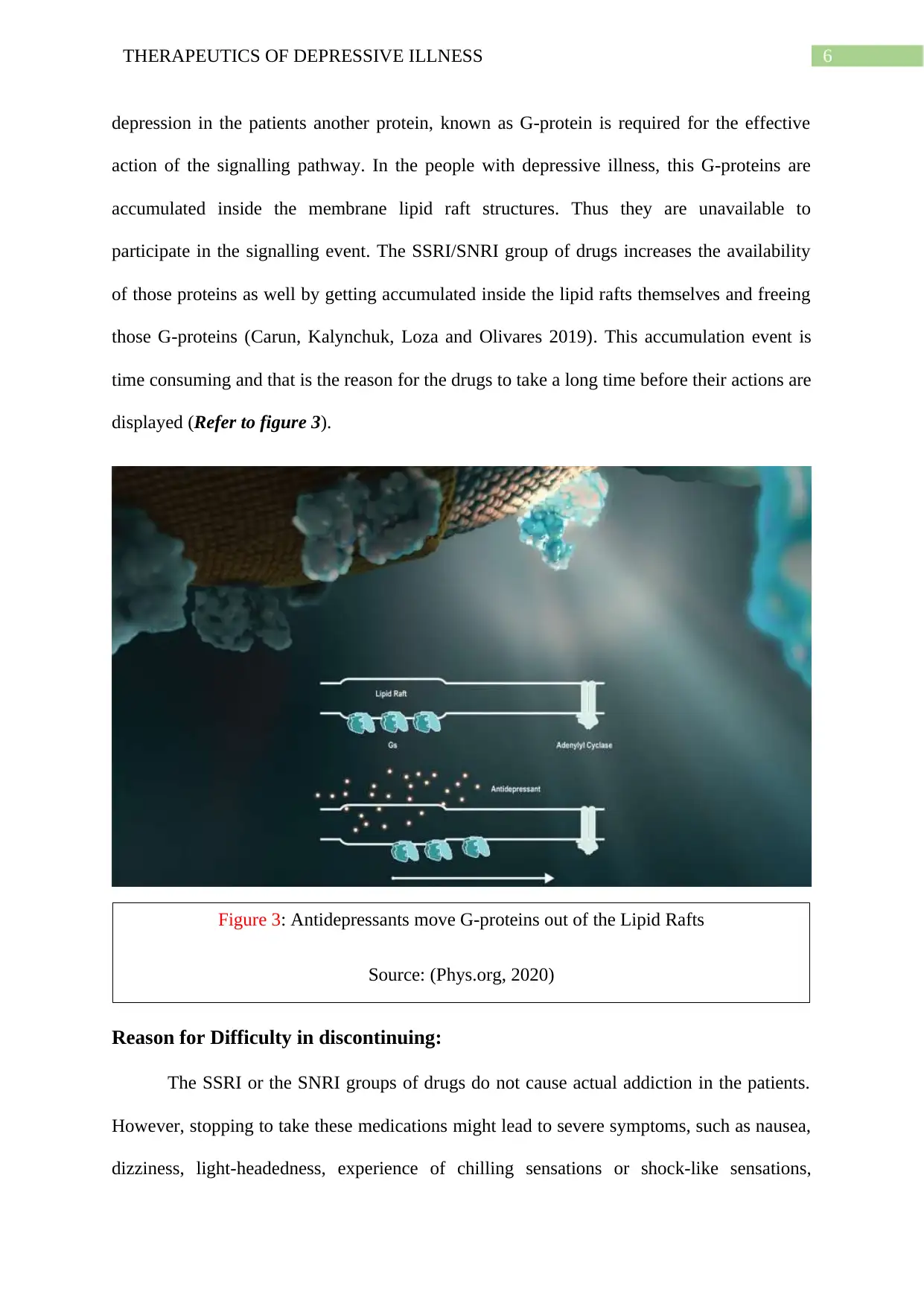
6THERAPEUTICS OF DEPRESSIVE ILLNESS
depression in the patients another protein, known as G-protein is required for the effective
action of the signalling pathway. In the people with depressive illness, this G-proteins are
accumulated inside the membrane lipid raft structures. Thus they are unavailable to
participate in the signalling event. The SSRI/SNRI group of drugs increases the availability
of those proteins as well by getting accumulated inside the lipid rafts themselves and freeing
those G-proteins (Carun, Kalynchuk, Loza and Olivares 2019). This accumulation event is
time consuming and that is the reason for the drugs to take a long time before their actions are
displayed (Refer to figure 3).
Reason for Difficulty in discontinuing:
The SSRI or the SNRI groups of drugs do not cause actual addiction in the patients.
However, stopping to take these medications might lead to severe symptoms, such as nausea,
dizziness, light-headedness, experience of chilling sensations or shock-like sensations,
Figure 3: Antidepressants move G-proteins out of the Lipid Rafts
Source: (Phys.org, 2020)
depression in the patients another protein, known as G-protein is required for the effective
action of the signalling pathway. In the people with depressive illness, this G-proteins are
accumulated inside the membrane lipid raft structures. Thus they are unavailable to
participate in the signalling event. The SSRI/SNRI group of drugs increases the availability
of those proteins as well by getting accumulated inside the lipid rafts themselves and freeing
those G-proteins (Carun, Kalynchuk, Loza and Olivares 2019). This accumulation event is
time consuming and that is the reason for the drugs to take a long time before their actions are
displayed (Refer to figure 3).
Reason for Difficulty in discontinuing:
The SSRI or the SNRI groups of drugs do not cause actual addiction in the patients.
However, stopping to take these medications might lead to severe symptoms, such as nausea,
dizziness, light-headedness, experience of chilling sensations or shock-like sensations,
Figure 3: Antidepressants move G-proteins out of the Lipid Rafts
Source: (Phys.org, 2020)
Paraphrase This Document
Need a fresh take? Get an instant paraphrase of this document with our AI Paraphraser
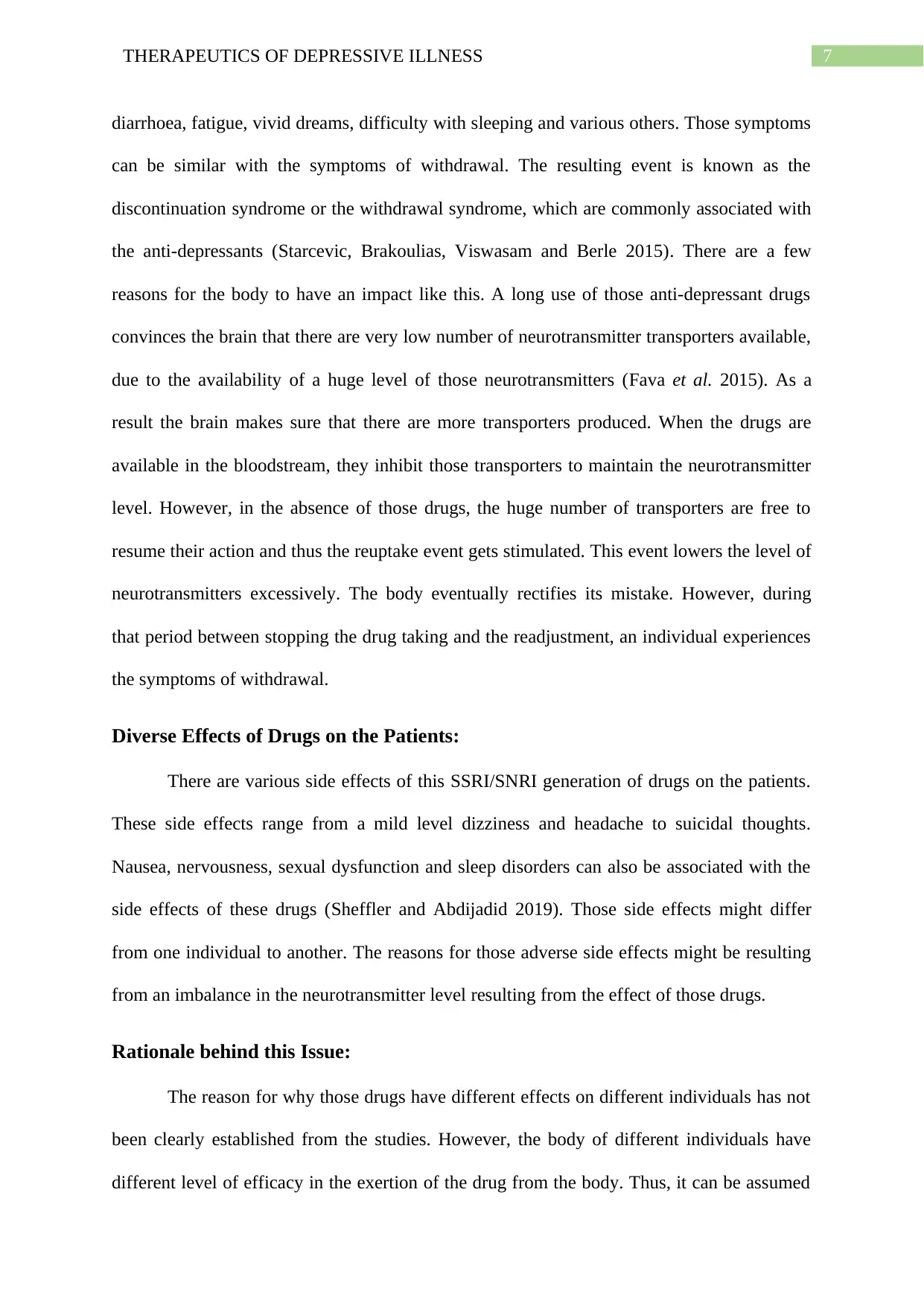
7THERAPEUTICS OF DEPRESSIVE ILLNESS
diarrhoea, fatigue, vivid dreams, difficulty with sleeping and various others. Those symptoms
can be similar with the symptoms of withdrawal. The resulting event is known as the
discontinuation syndrome or the withdrawal syndrome, which are commonly associated with
the anti-depressants (Starcevic, Brakoulias, Viswasam and Berle 2015). There are a few
reasons for the body to have an impact like this. A long use of those anti-depressant drugs
convinces the brain that there are very low number of neurotransmitter transporters available,
due to the availability of a huge level of those neurotransmitters (Fava et al. 2015). As a
result the brain makes sure that there are more transporters produced. When the drugs are
available in the bloodstream, they inhibit those transporters to maintain the neurotransmitter
level. However, in the absence of those drugs, the huge number of transporters are free to
resume their action and thus the reuptake event gets stimulated. This event lowers the level of
neurotransmitters excessively. The body eventually rectifies its mistake. However, during
that period between stopping the drug taking and the readjustment, an individual experiences
the symptoms of withdrawal.
Diverse Effects of Drugs on the Patients:
There are various side effects of this SSRI/SNRI generation of drugs on the patients.
These side effects range from a mild level dizziness and headache to suicidal thoughts.
Nausea, nervousness, sexual dysfunction and sleep disorders can also be associated with the
side effects of these drugs (Sheffler and Abdijadid 2019). Those side effects might differ
from one individual to another. The reasons for those adverse side effects might be resulting
from an imbalance in the neurotransmitter level resulting from the effect of those drugs.
Rationale behind this Issue:
The reason for why those drugs have different effects on different individuals has not
been clearly established from the studies. However, the body of different individuals have
different level of efficacy in the exertion of the drug from the body. Thus, it can be assumed
diarrhoea, fatigue, vivid dreams, difficulty with sleeping and various others. Those symptoms
can be similar with the symptoms of withdrawal. The resulting event is known as the
discontinuation syndrome or the withdrawal syndrome, which are commonly associated with
the anti-depressants (Starcevic, Brakoulias, Viswasam and Berle 2015). There are a few
reasons for the body to have an impact like this. A long use of those anti-depressant drugs
convinces the brain that there are very low number of neurotransmitter transporters available,
due to the availability of a huge level of those neurotransmitters (Fava et al. 2015). As a
result the brain makes sure that there are more transporters produced. When the drugs are
available in the bloodstream, they inhibit those transporters to maintain the neurotransmitter
level. However, in the absence of those drugs, the huge number of transporters are free to
resume their action and thus the reuptake event gets stimulated. This event lowers the level of
neurotransmitters excessively. The body eventually rectifies its mistake. However, during
that period between stopping the drug taking and the readjustment, an individual experiences
the symptoms of withdrawal.
Diverse Effects of Drugs on the Patients:
There are various side effects of this SSRI/SNRI generation of drugs on the patients.
These side effects range from a mild level dizziness and headache to suicidal thoughts.
Nausea, nervousness, sexual dysfunction and sleep disorders can also be associated with the
side effects of these drugs (Sheffler and Abdijadid 2019). Those side effects might differ
from one individual to another. The reasons for those adverse side effects might be resulting
from an imbalance in the neurotransmitter level resulting from the effect of those drugs.
Rationale behind this Issue:
The reason for why those drugs have different effects on different individuals has not
been clearly established from the studies. However, the body of different individuals have
different level of efficacy in the exertion of the drug from the body. Thus, it can be assumed
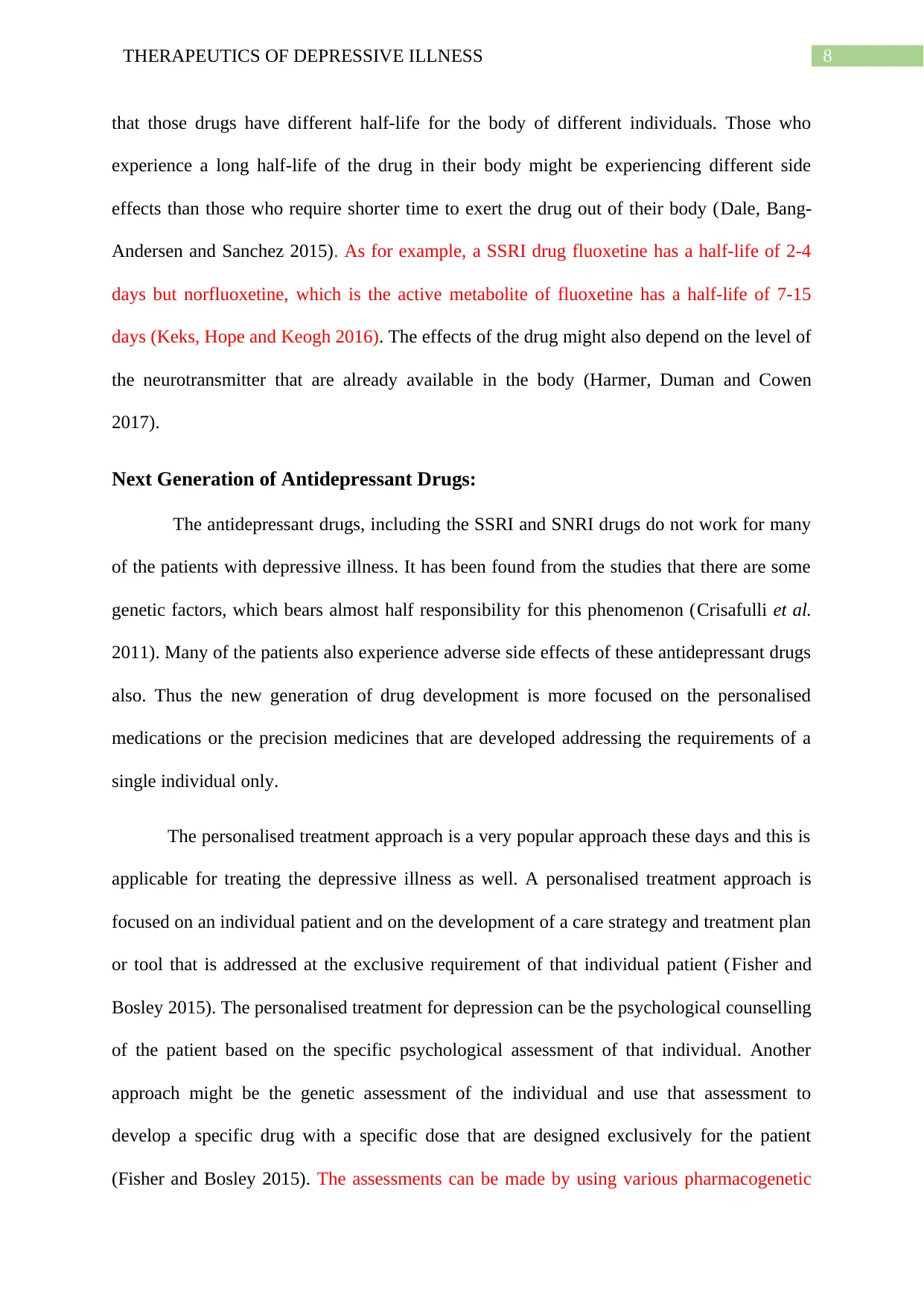
8THERAPEUTICS OF DEPRESSIVE ILLNESS
that those drugs have different half-life for the body of different individuals. Those who
experience a long half-life of the drug in their body might be experiencing different side
effects than those who require shorter time to exert the drug out of their body (Dale, Bang-
Andersen and Sanchez 2015). As for example, a SSRI drug fluoxetine has a half-life of 2-4
days but norfluoxetine, which is the active metabolite of fluoxetine has a half-life of 7-15
days (Keks, Hope and Keogh 2016). The effects of the drug might also depend on the level of
the neurotransmitter that are already available in the body (Harmer, Duman and Cowen
2017).
Next Generation of Antidepressant Drugs:
The antidepressant drugs, including the SSRI and SNRI drugs do not work for many
of the patients with depressive illness. It has been found from the studies that there are some
genetic factors, which bears almost half responsibility for this phenomenon (Crisafulli et al.
2011). Many of the patients also experience adverse side effects of these antidepressant drugs
also. Thus the new generation of drug development is more focused on the personalised
medications or the precision medicines that are developed addressing the requirements of a
single individual only.
The personalised treatment approach is a very popular approach these days and this is
applicable for treating the depressive illness as well. A personalised treatment approach is
focused on an individual patient and on the development of a care strategy and treatment plan
or tool that is addressed at the exclusive requirement of that individual patient (Fisher and
Bosley 2015). The personalised treatment for depression can be the psychological counselling
of the patient based on the specific psychological assessment of that individual. Another
approach might be the genetic assessment of the individual and use that assessment to
develop a specific drug with a specific dose that are designed exclusively for the patient
(Fisher and Bosley 2015). The assessments can be made by using various pharmacogenetic
that those drugs have different half-life for the body of different individuals. Those who
experience a long half-life of the drug in their body might be experiencing different side
effects than those who require shorter time to exert the drug out of their body (Dale, Bang-
Andersen and Sanchez 2015). As for example, a SSRI drug fluoxetine has a half-life of 2-4
days but norfluoxetine, which is the active metabolite of fluoxetine has a half-life of 7-15
days (Keks, Hope and Keogh 2016). The effects of the drug might also depend on the level of
the neurotransmitter that are already available in the body (Harmer, Duman and Cowen
2017).
Next Generation of Antidepressant Drugs:
The antidepressant drugs, including the SSRI and SNRI drugs do not work for many
of the patients with depressive illness. It has been found from the studies that there are some
genetic factors, which bears almost half responsibility for this phenomenon (Crisafulli et al.
2011). Many of the patients also experience adverse side effects of these antidepressant drugs
also. Thus the new generation of drug development is more focused on the personalised
medications or the precision medicines that are developed addressing the requirements of a
single individual only.
The personalised treatment approach is a very popular approach these days and this is
applicable for treating the depressive illness as well. A personalised treatment approach is
focused on an individual patient and on the development of a care strategy and treatment plan
or tool that is addressed at the exclusive requirement of that individual patient (Fisher and
Bosley 2015). The personalised treatment for depression can be the psychological counselling
of the patient based on the specific psychological assessment of that individual. Another
approach might be the genetic assessment of the individual and use that assessment to
develop a specific drug with a specific dose that are designed exclusively for the patient
(Fisher and Bosley 2015). The assessments can be made by using various pharmacogenetic
⊘ This is a preview!⊘
Do you want full access?
Subscribe today to unlock all pages.

Trusted by 1+ million students worldwide
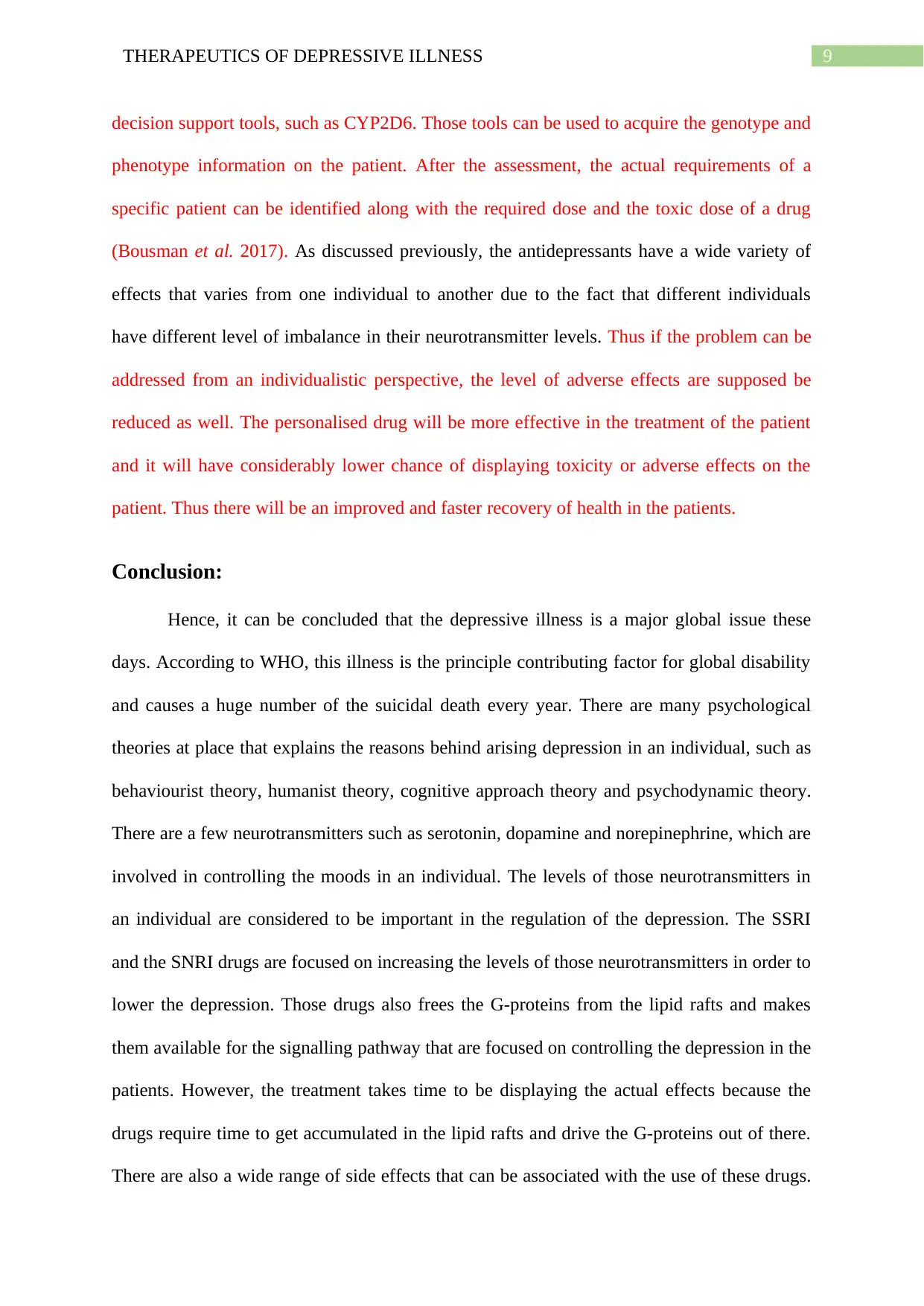
9THERAPEUTICS OF DEPRESSIVE ILLNESS
decision support tools, such as CYP2D6. Those tools can be used to acquire the genotype and
phenotype information on the patient. After the assessment, the actual requirements of a
specific patient can be identified along with the required dose and the toxic dose of a drug
(Bousman et al. 2017). As discussed previously, the antidepressants have a wide variety of
effects that varies from one individual to another due to the fact that different individuals
have different level of imbalance in their neurotransmitter levels. Thus if the problem can be
addressed from an individualistic perspective, the level of adverse effects are supposed be
reduced as well. The personalised drug will be more effective in the treatment of the patient
and it will have considerably lower chance of displaying toxicity or adverse effects on the
patient. Thus there will be an improved and faster recovery of health in the patients.
Conclusion:
Hence, it can be concluded that the depressive illness is a major global issue these
days. According to WHO, this illness is the principle contributing factor for global disability
and causes a huge number of the suicidal death every year. There are many psychological
theories at place that explains the reasons behind arising depression in an individual, such as
behaviourist theory, humanist theory, cognitive approach theory and psychodynamic theory.
There are a few neurotransmitters such as serotonin, dopamine and norepinephrine, which are
involved in controlling the moods in an individual. The levels of those neurotransmitters in
an individual are considered to be important in the regulation of the depression. The SSRI
and the SNRI drugs are focused on increasing the levels of those neurotransmitters in order to
lower the depression. Those drugs also frees the G-proteins from the lipid rafts and makes
them available for the signalling pathway that are focused on controlling the depression in the
patients. However, the treatment takes time to be displaying the actual effects because the
drugs require time to get accumulated in the lipid rafts and drive the G-proteins out of there.
There are also a wide range of side effects that can be associated with the use of these drugs.
decision support tools, such as CYP2D6. Those tools can be used to acquire the genotype and
phenotype information on the patient. After the assessment, the actual requirements of a
specific patient can be identified along with the required dose and the toxic dose of a drug
(Bousman et al. 2017). As discussed previously, the antidepressants have a wide variety of
effects that varies from one individual to another due to the fact that different individuals
have different level of imbalance in their neurotransmitter levels. Thus if the problem can be
addressed from an individualistic perspective, the level of adverse effects are supposed be
reduced as well. The personalised drug will be more effective in the treatment of the patient
and it will have considerably lower chance of displaying toxicity or adverse effects on the
patient. Thus there will be an improved and faster recovery of health in the patients.
Conclusion:
Hence, it can be concluded that the depressive illness is a major global issue these
days. According to WHO, this illness is the principle contributing factor for global disability
and causes a huge number of the suicidal death every year. There are many psychological
theories at place that explains the reasons behind arising depression in an individual, such as
behaviourist theory, humanist theory, cognitive approach theory and psychodynamic theory.
There are a few neurotransmitters such as serotonin, dopamine and norepinephrine, which are
involved in controlling the moods in an individual. The levels of those neurotransmitters in
an individual are considered to be important in the regulation of the depression. The SSRI
and the SNRI drugs are focused on increasing the levels of those neurotransmitters in order to
lower the depression. Those drugs also frees the G-proteins from the lipid rafts and makes
them available for the signalling pathway that are focused on controlling the depression in the
patients. However, the treatment takes time to be displaying the actual effects because the
drugs require time to get accumulated in the lipid rafts and drive the G-proteins out of there.
There are also a wide range of side effects that can be associated with the use of these drugs.
Paraphrase This Document
Need a fresh take? Get an instant paraphrase of this document with our AI Paraphraser
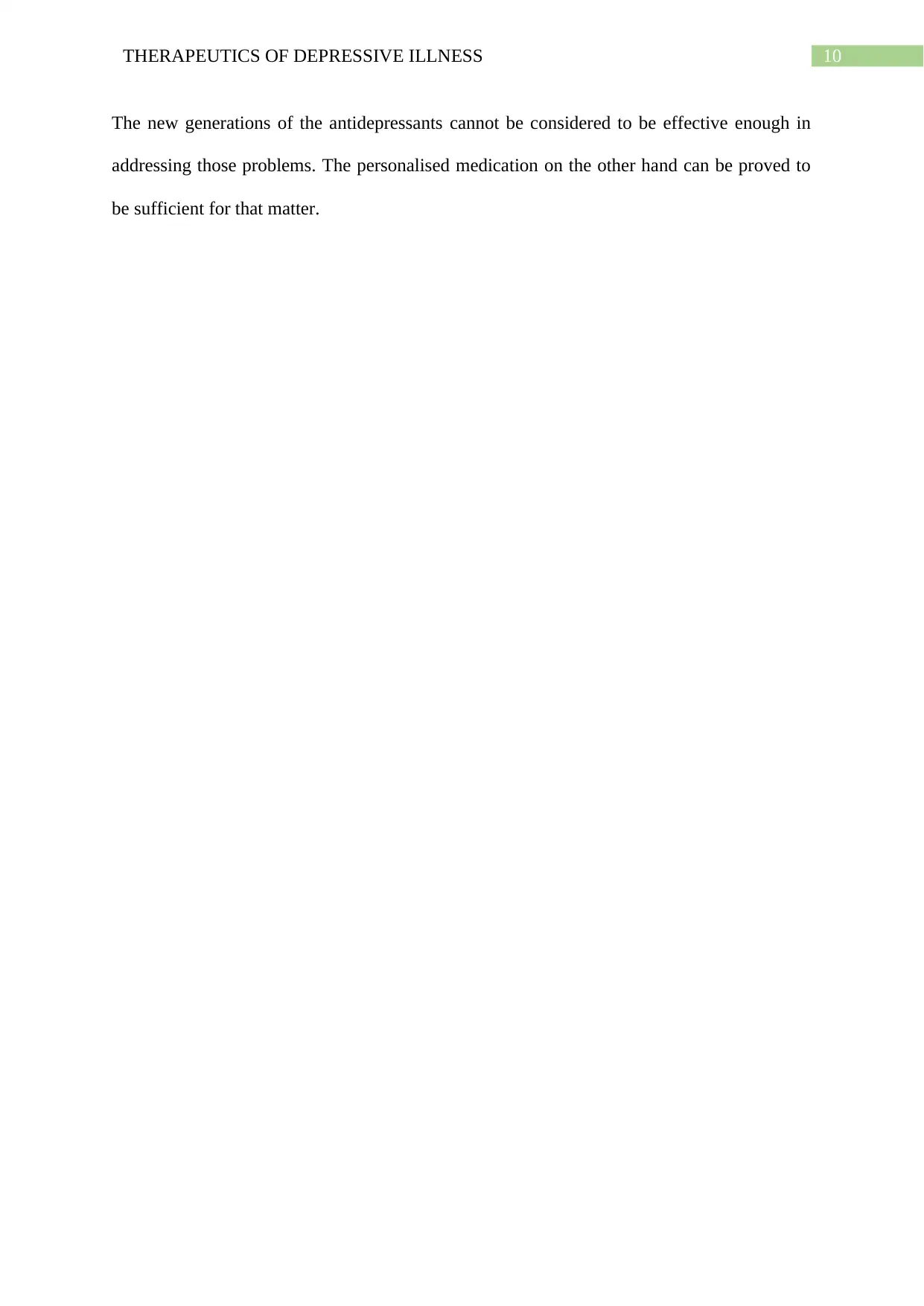
10THERAPEUTICS OF DEPRESSIVE ILLNESS
The new generations of the antidepressants cannot be considered to be effective enough in
addressing those problems. The personalised medication on the other hand can be proved to
be sufficient for that matter.
The new generations of the antidepressants cannot be considered to be effective enough in
addressing those problems. The personalised medication on the other hand can be proved to
be sufficient for that matter.
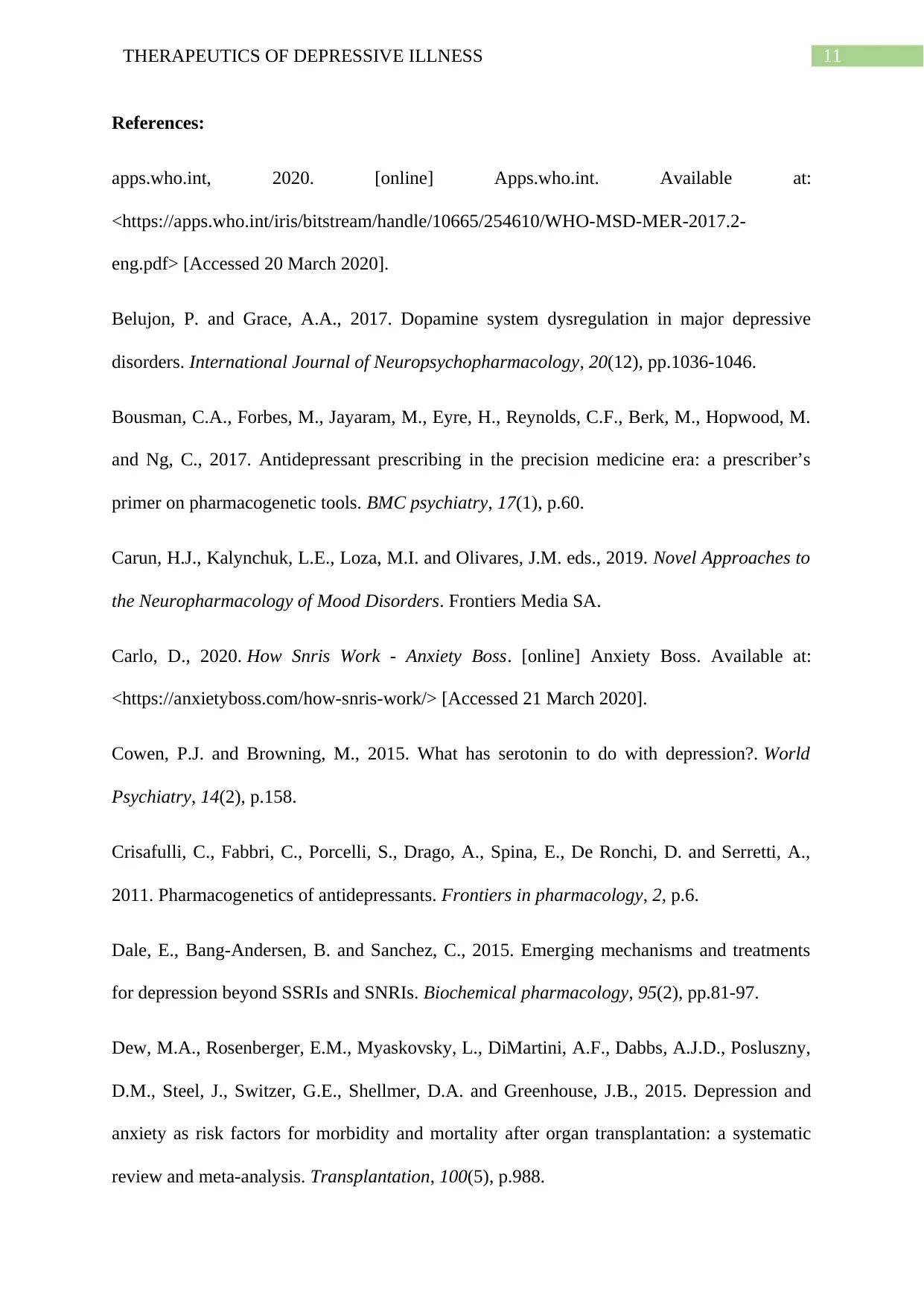
11THERAPEUTICS OF DEPRESSIVE ILLNESS
References:
apps.who.int, 2020. [online] Apps.who.int. Available at:
<https://apps.who.int/iris/bitstream/handle/10665/254610/WHO-MSD-MER-2017.2-
eng.pdf> [Accessed 20 March 2020].
Belujon, P. and Grace, A.A., 2017. Dopamine system dysregulation in major depressive
disorders. International Journal of Neuropsychopharmacology, 20(12), pp.1036-1046.
Bousman, C.A., Forbes, M., Jayaram, M., Eyre, H., Reynolds, C.F., Berk, M., Hopwood, M.
and Ng, C., 2017. Antidepressant prescribing in the precision medicine era: a prescriber’s
primer on pharmacogenetic tools. BMC psychiatry, 17(1), p.60.
Carun, H.J., Kalynchuk, L.E., Loza, M.I. and Olivares, J.M. eds., 2019. Novel Approaches to
the Neuropharmacology of Mood Disorders. Frontiers Media SA.
Carlo, D., 2020. How Snris Work - Anxiety Boss. [online] Anxiety Boss. Available at:
<https://anxietyboss.com/how-snris-work/> [Accessed 21 March 2020].
Cowen, P.J. and Browning, M., 2015. What has serotonin to do with depression?. World
Psychiatry, 14(2), p.158.
Crisafulli, C., Fabbri, C., Porcelli, S., Drago, A., Spina, E., De Ronchi, D. and Serretti, A.,
2011. Pharmacogenetics of antidepressants. Frontiers in pharmacology, 2, p.6.
Dale, E., Bang-Andersen, B. and Sanchez, C., 2015. Emerging mechanisms and treatments
for depression beyond SSRIs and SNRIs. Biochemical pharmacology, 95(2), pp.81-97.
Dew, M.A., Rosenberger, E.M., Myaskovsky, L., DiMartini, A.F., Dabbs, A.J.D., Posluszny,
D.M., Steel, J., Switzer, G.E., Shellmer, D.A. and Greenhouse, J.B., 2015. Depression and
anxiety as risk factors for morbidity and mortality after organ transplantation: a systematic
review and meta-analysis. Transplantation, 100(5), p.988.
References:
apps.who.int, 2020. [online] Apps.who.int. Available at:
<https://apps.who.int/iris/bitstream/handle/10665/254610/WHO-MSD-MER-2017.2-
eng.pdf> [Accessed 20 March 2020].
Belujon, P. and Grace, A.A., 2017. Dopamine system dysregulation in major depressive
disorders. International Journal of Neuropsychopharmacology, 20(12), pp.1036-1046.
Bousman, C.A., Forbes, M., Jayaram, M., Eyre, H., Reynolds, C.F., Berk, M., Hopwood, M.
and Ng, C., 2017. Antidepressant prescribing in the precision medicine era: a prescriber’s
primer on pharmacogenetic tools. BMC psychiatry, 17(1), p.60.
Carun, H.J., Kalynchuk, L.E., Loza, M.I. and Olivares, J.M. eds., 2019. Novel Approaches to
the Neuropharmacology of Mood Disorders. Frontiers Media SA.
Carlo, D., 2020. How Snris Work - Anxiety Boss. [online] Anxiety Boss. Available at:
<https://anxietyboss.com/how-snris-work/> [Accessed 21 March 2020].
Cowen, P.J. and Browning, M., 2015. What has serotonin to do with depression?. World
Psychiatry, 14(2), p.158.
Crisafulli, C., Fabbri, C., Porcelli, S., Drago, A., Spina, E., De Ronchi, D. and Serretti, A.,
2011. Pharmacogenetics of antidepressants. Frontiers in pharmacology, 2, p.6.
Dale, E., Bang-Andersen, B. and Sanchez, C., 2015. Emerging mechanisms and treatments
for depression beyond SSRIs and SNRIs. Biochemical pharmacology, 95(2), pp.81-97.
Dew, M.A., Rosenberger, E.M., Myaskovsky, L., DiMartini, A.F., Dabbs, A.J.D., Posluszny,
D.M., Steel, J., Switzer, G.E., Shellmer, D.A. and Greenhouse, J.B., 2015. Depression and
anxiety as risk factors for morbidity and mortality after organ transplantation: a systematic
review and meta-analysis. Transplantation, 100(5), p.988.
⊘ This is a preview!⊘
Do you want full access?
Subscribe today to unlock all pages.

Trusted by 1+ million students worldwide
1 out of 14
Related Documents
Your All-in-One AI-Powered Toolkit for Academic Success.
+13062052269
info@desklib.com
Available 24*7 on WhatsApp / Email
![[object Object]](/_next/static/media/star-bottom.7253800d.svg)
Unlock your academic potential
Copyright © 2020–2026 A2Z Services. All Rights Reserved. Developed and managed by ZUCOL.





